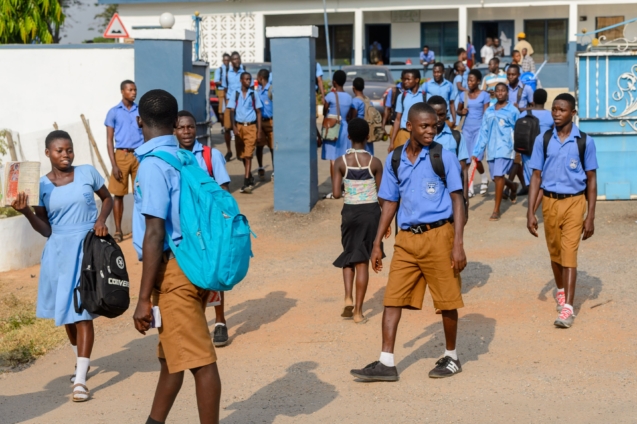There is sweeping reforms to the Senior High School system as government commences the implementation of a new curriculum on Monday, November 4.
Government says the changes are to focus on building character development and holistic education to create well-rounded, ready-for-the-world students.
The new curriculum also takes over from the existing system with students now required to do a minimum of seven and a maximum of nine learning areas in school.
In an interview with JoyNews, the acting head of Curriculum Development at the National Council for Curriculum Assessment (NaCCA), Reginald Quartey explaining why this change is necessary noted that the new curriculum is expected to shape learners since the 21st century skill and competence is being integrated to be able to develop values.
“The curriculum is not only looking at what we call the cognitive domain but we are also looking at the behavioral and social domains including values. We were thinking that this curriculum should be as such that after learners have through this curriculum a number of years, you will be able to major based on the kind of things you see in our society,” he explained.
The major changes include grouping specific learning areas into four groups with students at liberty to choose subjects that were not included in the original courses.
Director General of NaCCA, Professor Yayra Dzakadzie explained this new system with General Science as a case study.
“The curriculum is organized into four groups: A, B, C, and D. Group A includes core subjects mandatory for all learners. For science students, core science is replaced by dedicated courses in physics, chemistry, and biology.
"Group C offers subjects related to specific learning areas, such as additional mathematics, food and nutrition, and electronics. Science students may take courses from Group C to broaden their studies. Group D provides options outside the core science focus, including economics, religion, history, and Ghanaian languages, allowing students to explore additional interests. However, students are limited to a maximum of nine subjects for program completion.”
Prof Yayra Dzakadzie added that significant and extensive engagement has been done with all stakeholders before this implementation.
Latest Stories
-
#TheManifestoDebate: We’ll provide potable water, expand water distribution network – NDC
17 mins -
IPR Ghana@50: Pupils educated to keep the environment clean
23 mins -
PenTrust CEO named ‘Best Pensions CEO’, company wins ‘Scheme Administrator Award’ at Ghana Accountancy & Finance Awards 2024
43 mins -
Alan Kyerematen’s ‘Brighter Future for Health Professionals’ in Ghana Revealed in Bono
53 mins -
#TheManifestoDebate: NPP will ensure a safer, cleaner and greener environment – Dr Kokofu
1 hour -
2024 Election: Police to deal with individuals who will cause trouble – IGP
1 hour -
Seychelles President’s visit rekindles historical and diplomatic ties with Ghana
1 hour -
Election 2024: EC destroys defective ballot papers for Ahafo and Volta regions
1 hour -
2024 Election: I am sad EC disqualified me, but I endorse CPP’s candidate – PNP’s Nabla
2 hours -
I want to build a modern, inclusive country anchored by systems and data – Bawumia to CSOs
2 hours -
Miss Health Ghana 2024: Kujori Esther Cachana crowned new Health Ambassador
2 hours -
Playback: The manifesto debate on WASH and climate change
2 hours -
Alan Kyerematen saddened by NDC and NPP’s neglect of Krofrom Market in the Ashanti Region
2 hours -
CSIR Executive Director urges farmers to adopt technology for improved farming
2 hours -
Football Impact Africa’s Ghetto Love Initiative inspires change in Teshie
2 hours

